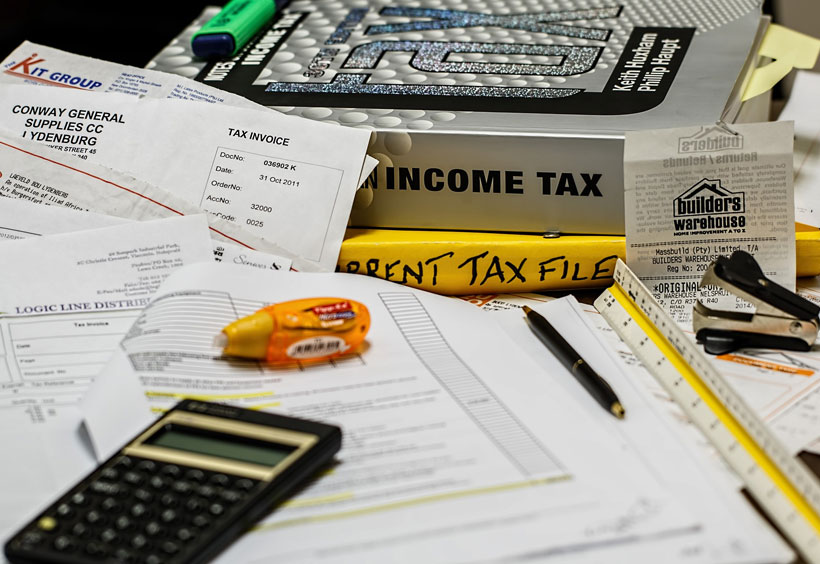How to Start a Tax Preparation Business
Sparkpush Editorial Team
Updated December 17, 2023
Edited by: Mike Shelby

Starting a tax preparation business can be a lucrative and rewarding venture, particularly during tax season. The demand for professional tax services is high, with many individuals and businesses seeking expert help to navigate the ever-complex tax landscape. Here’s a comprehensive guide on how to start a successful tax preparation business.
Step 1: Understand the Industry
Launching a tax preparation business requires more than just a knack for numbers; it demands a deep understanding of the industry. Begin by acquainting yourself with the intricacies of tax laws and regulations, which are often complex and subject to change. This foundational knowledge is crucial for accurately handling income tax returns for a diverse range of clients.
Familiarize yourself with the various tax forms and schedules, and understand how different financial scenarios, from individual earnings to corporate investments, impact tax liabilities. It’s also important to learn about the specific tax considerations for different client groups, such as individuals, small businesses, corporations, and nonprofit organizations, as each has unique filing requirements and potential deductions.
Staying updated with the latest in tax news and legislative changes is vital. Tax laws can evolve rapidly, and staying informed ensures you provide your clients with the most current and accurate advice.
Additionally, proficiency in tax preparation software is essential. These tools not only streamline the process but also help in identifying potential deductions and credits, ensuring your clients receive the best possible service.
In essence, a thorough understanding of the tax industry is the bedrock upon which you can build a successful tax preparation business. It enables you to offer reliable, informed, and efficient services, making you a trusted advisor to your clients.
Step 2: Pros and Cons of Starting a Tax Preparation Business
Before you jump into the tax preparation business, let’s chat about what that really means. Here’s the lowdown on the good and the not-so-good parts of starting this kind of venture.
Pros:
- Always in Demand: Let’s face it, taxes aren’t going anywhere, and neither is the need for folks who understand them.
- Be Your Own Boss: Love choosing your own hours? This gig’s got that perk, especially outside the busy season.
- Startup’s a Breeze: Compared to other businesses, setting up shop here won’t break the bank.
- Busy Season = Big Bucks: When tax season hits, you can make a pretty penny.
- Helping Hand: You get to be the hero, helping people and businesses make sense of those confusing tax laws.
- Grow as You Go: Start solo and expand when you’re ready – it’s all up to you.
Cons:
- Feast or Famine: Most of your income will come in a few months, so budgeting is key.
- Tax Season Tornado: Brace yourself for the whirlwind of tax season. It’s hectic!
- Homework Never Ends: Tax laws change like the weather. You’ve got to keep learning to keep up.
- Mess Up, Pay Up: Mistakes can be costly in this game, so dot your I’s and cross your T’s.
- Crowded Field: You’re not the only tax whiz around. The competition can be tough.
- Red Tape Tango: There’s a bit of a dance with regulations and certifications, so be prepared.
So, there you have it! Starting a tax preparation business has its ups and downs, but it’s all about what fits your style and goals. Ready to dive in? Well, let’s move on to the next step!
Step 3: Obtain the Necessary Education and Certification
To establish credibility and competence in your tax preparation business, it’s important to have the right educational background and certifications. While you don’t need to be a Certified Public Accountant (CPA) to prepare taxes, a foundational understanding of accounting or finance is invaluable. This can be achieved through a degree in accounting, finance, or a related field, or through specific tax preparation courses and certifications offered by various institutions.
In the United States, the first step to becoming a professional tax preparer is to register with the IRS and obtain a Preparer Tax Identification Number (PTIN), which is mandatory for anyone who prepares or assists in preparing federal tax returns for compensation.
For those aiming to offer more comprehensive services, including representing clients in dealings with the IRS, becoming an Enrolled Agent (EA) is a significant credential. To earn the EA designation, you must pass the IRS Special Enrollment Examination, which covers a wide range of tax topics, or meet specific experience requirements as an IRS employee. Becoming an EA not only enhances your expertise but also elevates your professional standing in the eyes of potential clients.
These steps in education and certification are crucial to building a tax preparation business that is not only competent and compliant but also trusted and respected in the field.
Step 4: Develop a Business Plan
Creating a business plan is an essential step in establishing a successful tax prep company. This document serves as your roadmap, guiding your strategic decisions and helping you navigate the complexities of the industry.
Begin by clearly defining your business objectives. What are your short-term and long-term goals? Are you aiming to cater to a broad clientele or focus on specific segments like small businesses, freelancers, or nonprofit organizations?
Your target market analysis is crucial. Understand who your potential clients are, what specific needs they have, and how your services can address those needs. Research the market to identify existing gaps that you can fill.
Your marketing and sales strategies are the next vital components. Detail how you plan to attract and retain clients. This could include digital marketing tactics, networking within local business communities, or forming partnerships with financial advisors.
Also, consider how you will differentiate your services from competitors. Offering additional services like year-round financial planning, tax-saving strategies, or specializing in tax issues related to a specific industry can set you apart.
Include financial projections in your plan as well. Estimate your startup costs, operating expenses, pricing strategy, and revenue projections. This financial forecast will help you manage your budget effectively and plan for growth.
Remember, a comprehensive and well-thought-out business plan is not just a formal document; it’s a tool that keeps your business focused and on track to win.
Step 5: Register Your Business and Comply with Legal Requirements
Ensuring that your tax preparation business is fully compliant with legal requirements is a crucial step towards establishing a legitimate and trustworthy practice. Start by selecting a business name that reflects your services and register it with your local government to ensure it’s unique and protected.
The next vital step is to obtain an Employer Identification Number (EIN) from the IRS. This is essential for tax purposes and is required if you plan to hire employees. The EIN also allows you to open a business bank account, which is crucial for managing your finances separately from your personal accounts.
Depending on where you plan to operate your business, you may also need to acquire specific local permits and licenses. These requirements can vary greatly depending on your location and the scope of your services, so it’s important to research the specific regulations in your area.
To navigate these legal waters confidently, consider consulting with an attorney or a business advisor who specializes in small businesses or tax services. They can provide valuable guidance on compliance, legal structuring, and other regulatory matters to ensure that your business is set up correctly and operates within the legal framework from day one.
Step 6: Purchase Tax Preparation Software
In today’s fast-paced, digital world, having reliable tax preparation software is indispensable for your business. This software not only streamlines the tax preparation process but also ensures accuracy and compliance with the latest tax laws.
When selecting software, consider professional-grade options that cater to the needs of tax preparers. Popular choices in the market include TurboTax, known for its user-friendly interface; H&R Block, which offers a comprehensive suite of tools for various tax situations; and TaxAct, appreciated for its affordability and efficiency.
Your choice should align with the specific needs of your business and clientele. Look for features like easy data import, error-checking algorithms, e-filing capabilities, and support for different tax forms and schedules. Some software also offers additional tools for client management and audit support, which can be incredibly beneficial.
Remember, the right tax software is a critical investment in your business. It not only aids in preparing and filing returns efficiently but also enhances your credibility as a professional. Take the time to research and choose a software that offers the right mix of features, reliability, and customer support to best serve your clients and streamline your workflow.
Step 7: Set Up Your Office
Establishing a functional and professional office is a key step in launching your tax preparation company. Whether you opt for a home office or rent a commercial space, the environment should foster efficiency and professionalism.
Firstly, choose a quiet and comfortable area dedicated solely to your work. This helps in maintaining a clear boundary between your professional and personal life, especially if you’re working from home.
Equip your office with the essentials. A reliable computer with sufficient processing power and memory is crucial, as you’ll be handling complex tax software and multiple client files. Pair this with a high-quality printer for printing documents and tax forms. A secure internet connection is non-negotiable, not only for accessing online resources but also for e-filing tax returns securely.
Don’t overlook basic office supplies – paper, pens, calculators, file folders, and organizers. A dedicated telephone line and possibly a fax machine are also important for maintaining clear and professional communication with your clients.
Lastly, consider the ergonomics and aesthetics of your office. Comfortable seating, good lighting, and a clutter-free workspace can significantly enhance your productivity and create a positive impression if clients visit your office.
Remember, your office is the command center of your tax preparation operation. Setting it up thoughtfully can contribute significantly to your efficiency and success.
Step 8: Market Your Services
In the competitive field of tax preparation, a well-crafted marketing strategy is essential for attracting and retaining clients. Begin by creating a professional website that serves as the digital face of your business. It should clearly outline your services, qualifications, and contact information. Including client testimonials can also boost credibility.
Social media is a powerful tool for reaching potential clients. Platforms like LinkedIn, Facebook, and even Instagram can help you connect with your target audience. Share informative content, tax tips, and updates on tax laws to establish yourself as a knowledgeable professional in the field.
Local networking is another key component. Attend business events, join local chambers of commerce, or participate in community groups. These activities not only increase your visibility but also help build relationships that can lead to referrals.
Consider offering free tax workshops or seminars. These can be excellent opportunities to demonstrate your expertise, help the community, and attract clients who need more in-depth services.
Above all, remember that your reputation is your most valuable asset. Providing excellent, reliable service is the best marketing tool you have, as satisfied clients are more likely to refer your services to others. Word-of-mouth referrals can significantly contribute to the growth and sustainability of your business.
Step 9: Provide Excellent Customer Service
In the tax industry, exceptional customer service is not just a nice-to-have; it’s the cornerstone of your reputation and client retention. Your ability to be professional, respectful, and responsive in all your interactions can set you apart in a field where trust and reliability are paramount.
Always prioritize prompt and clear communication. Whether responding to inquiries, updating clients on the status of their tax filings, or addressing concerns, timely and effective communication underscores your commitment to their needs.
The confidentiality and security of client information are crucial. Implement robust data protection measures and handle all client documents with the utmost care. This not only safeguards your clients’ sensitive information but also reinforces their trust in your services.
Go beyond the basics of tax preparation by understanding and anticipating your clients’ needs. Offer personalized advice where appropriate and be willing to explain complex tax concepts in understandable terms.
Remember, a satisfied client is much more than just a business transaction; they can become a source of repeat business and referrals. A recommendation from a satisfied client is one of the most powerful endorsements your business can receive. Strive to make every client interaction a positive and reassuring experience, laying the groundwork for a long-lasting professional relationship.
The Best States for Your Tax Prep Service
Ranking the best states to start a tax preparation business can vary depending on various factors such as market demand, regulations, competition, and cost of living. It’s important to conduct thorough research before deciding. However, here is a general ranking based on some key factors:
- New York
- California
- Texas
- Florida
- Illinois
- Massachusetts
- Georgia
- Pennsylvania
- New Jersey
- Virginia
- Ohio
- Maryland
- North Carolina
- Connecticut
- Michigan
- Colorado
- Arizona
- Minnesota
- Washington
- Wisconsin
- Oregon
- Indiana
- Tennessee
- Missouri
- Nevada
- Utah
- New Hampshire
- Kentucky
- Louisiana
- Alabama
- South Carolina
- Oklahoma
- Iowa
- Nebraska
- Kansas
- Arkansas
- Rhode Island
- Mississippi
- Maine
- Hawaii
- Idaho
- New Mexico
- Montana
- West Virginia
- North Dakota
- South Dakota
- Alaska
- Vermont
- Wyoming
- Delaware
The Bottom Line
Starting a tax preparation business can be a profitable venture, especially if you enjoy helping others navigate the complex world of taxes. With the right education, certification, and business plan, you’ll be well on your way to owning a successful tax preparation business.
Remember, the road to success might be challenging, but with perseverance, dedication, and hard work, your tax preparation business can thrive. Good luck!









